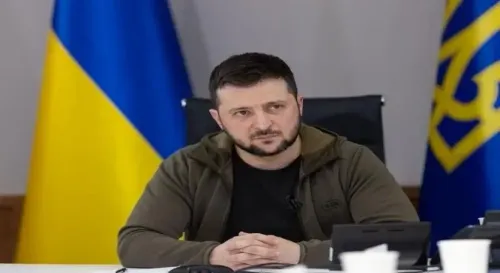What Are Russia and Japan Saying About Rising India-Pak Tensions?

Synopsis
Key Takeaways
- Russia and Japan express concern over escalating tensions.
- Operation Sindoor targets terror infrastructure.
- Calls for restraint and dialogue are emphasized.
- International community watches closely.
- Need for peaceful resolutions highlighted.
Moscow, May 7 (NationPress) Russia and Japan have voiced significant apprehension on Wednesday regarding the increasing military hostilities between India and Pakistan.
"We are profoundly worried about the escalated military tensions between India and Pakistan following the terror attack near Pahalgam," stated Maria Zakharova, the spokesperson for the Russian Foreign Ministry.
This statement followed the commencement of Operation Sindoor by the Indian armed forces, which targeted nine critical terror sites within Pakistan and Pakistan-occupied Kashmir (PoK) as a reaction to the heinous April 22 attack that resulted in the deaths of 26 innocent individuals.
"Russia firmly denounces terrorism and opposes all its manifestations, stressing the importance of global cooperation to combat this menace effectively," Zakharova added.
"We urge the involved parties to practice restraint to avoid further escalation in the region. We remain hopeful that the prevailing disputes between India and Pakistan will be resolved through peaceful political and diplomatic channels, adhering to the stipulations of the 1972 Shimla Agreement and the 1999 Lahore Declaration," she stated.
Earlier on Monday, Russian President Vladimir Putin reached out to Prime Minister Narendra Modi, expressing strong condemnation of the April 22 terror incident and extending "full support" to India in its ongoing battle against terrorism.
Moreover, Japanese Foreign Minister Iwaya Takeshi, reaffirming Japan's stance against terrorism, remarked, "Japan is genuinely concerned that the recent sequence of events could lead to further retaliations and might escalate into a full-scale military confrontation. Japan strongly encourages both India and Pakistan to exercise restraint and stabilize the situation through dialogue, ensuring peace and stability in South Asia."
"Japan will persist in closely monitoring the situation while implementing all possible measures to safeguard Japanese nationals abroad," the foreign minister added.
Operation Sindoor commenced in the early hours of Wednesday, involving a tri-services operation conducted collaboratively by the Indian Army, Air Force, and Navy.
The operation targeted infrastructure associated with the terror organizations responsible for the April 22 attack.
The Indian government stated on Wednesday that India has exercised its right to retaliate against heinous acts of terrorism originating from the neighboring country.
In a press briefing, Foreign Secretary Vikram Misri, alongside Colonel Sophia Qureshi and Wing Commander Vyomika Singh, discussed 'Operation Sindoor', explaining that India’s response to the attacks in Pahalgam was measured, calibrated, and non-escalatory.
Real-time monitoring and post-strike evaluations confirmed the destruction of the intended targets.
Operation Sindoor is one of India's most assertive cross-border military responses since the Balakot airstrikes in 2019.









